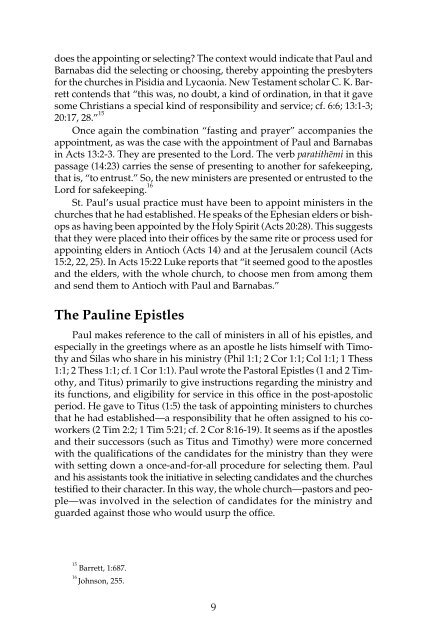45930 Divine Call CTCR final - The Lutheran Church—Missouri Synod
45930 Divine Call CTCR final - The Lutheran Church—Missouri Synod
45930 Divine Call CTCR final - The Lutheran Church—Missouri Synod
You also want an ePaper? Increase the reach of your titles
YUMPU automatically turns print PDFs into web optimized ePapers that Google loves.
does the appointing or selecting? <strong>The</strong> context would indicate that Paul and<br />
Barnabas did the selecting or choosing, thereby appointing the presbyters<br />
for the churches in Pisidia and Lycaonia. New Testament scholar C. K. Barrett<br />
contends that “this was, no doubt, a kind of ordination, in that it gave<br />
some Christians a special kind of responsibility and service; cf. 6:6; 13:1-3;<br />
20:17, 28.” 15<br />
Once again the combination “fasting and prayer” accompanies the<br />
appointment, as was the case with the appointment of Paul and Barnabas<br />
in Acts 13:2-3. <strong>The</strong>y are presented to the Lord. <strong>The</strong> verb paratithēmi in this<br />
passage (14:23) carries the sense of presenting to another for safekeeping,<br />
that is, “to entrust.” So, the new ministers are presented or entrusted to the<br />
Lord for safekeeping. 16<br />
St. Paul’s usual practice must have been to appoint ministers in the<br />
churches that he had established. He speaks of the Ephesian elders or bishops<br />
as having been appointed by the Holy Spirit (Acts 20:28). This suggests<br />
that they were placed into their offices by the same rite or process used for<br />
appointing elders in Antioch (Acts 14) and at the Jerusalem council (Acts<br />
15:2, 22, 25). In Acts 15:22 Luke reports that “it seemed good to the apostles<br />
and the elders, with the whole church, to choose men from among them<br />
and send them to Antioch with Paul and Barnabas.”<br />
<strong>The</strong> Pauline Epistles<br />
Paul makes reference to the call of ministers in all of his epistles, and<br />
especially in the greetings where as an apostle he lists himself with Timothy<br />
and Silas who share in his ministry (Phil 1:1; 2 Cor 1:1; Col 1:1; 1 <strong>The</strong>ss<br />
1:1; 2 <strong>The</strong>ss 1:1; cf. 1 Cor 1:1). Paul wrote the Pastoral Epistles (1 and 2 Timothy,<br />
and Titus) primarily to give instructions regarding the ministry and<br />
its functions, and eligibility for service in this office in the post-apostolic<br />
period. He gave to Titus (1:5) the task of appointing ministers to churches<br />
that he had established—a responsibility that he often assigned to his coworkers<br />
(2 Tim 2:2; 1 Tim 5:21; cf. 2 Cor 8:16-19). It seems as if the apostles<br />
and their successors (such as Titus and Timothy) were more concerned<br />
with the qualifications of the candidates for the ministry than they were<br />
with setting down a once-and-for-all procedure for selecting them. Paul<br />
and his assistants took the initiative in selecting candidates and the churches<br />
testified to their character. In this way, the whole church—pastors and people—was<br />
involved in the selection of candidates for the ministry and<br />
guarded against those who would usurp the office.<br />
15<br />
Barrett, 1:687.<br />
16<br />
Johnson, 255.<br />
9


